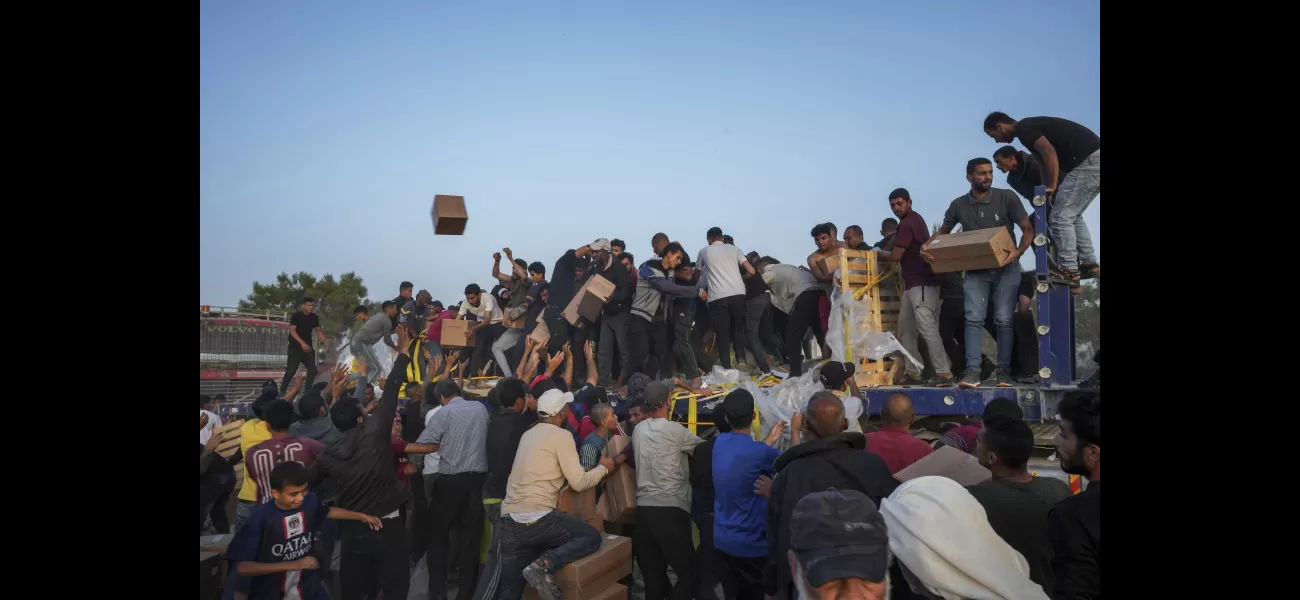Hamas wants changes to Gaza ceasefire deal, US considering how to respond.
Hamas responded to the US-proposed ceasefire in Gaza, requesting changes to the agreement.
June 12th 2024.

Yesterday, Hamas announced that it had given its response to the US-backed proposal for a ceasefire in Gaza to the mediators. However, they did mention that they had a few amendments that they would like to see included in the deal. It seemed like their response did not explicitly accept the proposal that the United States had been pushing for, but it did keep negotiations going in hopes of finally bringing an end to the eight-month war.
Both Qatar and Egypt, who have been instrumental in mediating alongside the US, confirmed that they had received Hamas' response and that it was currently being evaluated by the mediators. White House national security spokesman John Kirby also acknowledged receiving the response, stating that they were currently studying it. Hamas spokesperson Jihad Taha mentioned that their reply included amendments that focused on a ceasefire, withdrawal, reconstruction, and exchange, but did not elaborate further.
Although Hamas officials expressed support for the overall outline of the deal, they were still skeptical about whether Israel would follow through on its promises, especially concerning a permanent end to the fighting and a full withdrawal from Gaza in exchange for the release of the hostages. Despite the US announcing Israel's acceptance of the proposal, Israeli Prime Minister Benjamin Netanyahu gave mixed signals, stating that they would not stop until they achieved their goal of destroying Hamas.
In an attempt to push through the deal, US Secretary of State Antony Blinken has been in the region this week, making it his eighth visit since the conflict began. He continued to pressure Hamas to accept the proposal, citing the recent UN Security Council vote in its favor as a sign of the world's support. Blinken also mentioned that Netanyahu had reaffirmed his commitment to the proposal during their meeting on Monday.
In a joint statement with the smaller Islamic Jihad militant group, Hamas announced that they had submitted their response to Qatar and Egypt and were ready to work towards reaching an agreement. Their priority was to bring a complete stop to the war. A senior Hamas official, Osama Hamdan, told Lebanon's Al-Mayadeen television that they had submitted some remarks on the proposal to the mediators, but did not provide further details.
The proposal has sparked hope of ending the conflict that has led to the deaths of over 37,000 Palestinians and forced 80% of the population of 2.3 million to flee their homes. The ongoing fighting and Israeli restrictions have made it challenging to provide humanitarian aid to the isolated coastal enclave, resulting in widespread hunger. The campaign began when Israel vowed to eliminate Hamas after they and other militants launched an attack on southern Israel on October 7, killing over 1200 people, mostly civilians, and taking around 250 hostages.
During a weeklong ceasefire in 2020, over 100 hostages were released in exchange for Palestinians who were imprisoned by Israel. Later that day, Blinken attended a Gaza aid conference in Jordan, where he announced an additional $400 million in aid for Palestinians in Gaza and the surrounding region, bringing the total US assistance to over $674 million in the past eight months. UN Secretary-General António Guterres also addressed the conference, stating that the amount of aid reaching the United Nations in Gaza had decreased by two-thirds since the Israeli offensive in the city of Rafah in May.
Guterres emphasized the need for all border crossings to be opened, stating that the speed and scale of destruction and killing in Gaza were unlike anything he had seen since taking over the UN in 2017. In a separate development, the UN human rights office declared that both Israeli forces and Palestinian militants may have committed war crimes during the Israeli raid that rescued four hostages over the weekend. According to Gaza's Health Ministry, at least 274 Palestinians were killed during the operation.
Blinken, who was in Cairo on Monday, was also expected to visit Qatar, where talks would likely focus on the next steps in the push for a deal. On Monday, the UN Security Council overwhelmingly voted in favor of the proposal, with 14 out of 15 members supporting it, while Russia abstained. The resolution urges Israel and Hamas to fully implement the proposal's terms without delay and without conditions.
President Joe Biden had announced the proposal last month, outlining a three-phased plan that would start with a six-week ceasefire and the release of some hostages in exchange for Palestinian prisoners. Israeli forces would then withdraw from populated areas, and civilians would be allowed to return to their homes. However, Hamas is still holding around 120 hostages, with a third of them believed to be deceased.
The first phase also includes the safe distribution of humanitarian aid throughout Gaza, with plans for 600 trucks of aid to enter daily. Simultaneously, negotiations would begin for the second phase, which aims to bring a permanent end to the hostilities and the release of all remaining hostages, with a full Israeli withdrawal from Gaza. The third and final phase would focus on a major reconstruction plan for Gaza and the return of any deceased hostages' remains to their families.
Hamas had previously accepted a similar proposal last month, but Israel rejected it. Biden had presented it as an Israeli proposal, but Netanyahu publicly disputed some key aspects, stating that certain parts were left out. The conflicting signals could be attributed to Netanyahu's political dilemma, as his far-right coalition allies have threatened to bring down his government if he ends the war without destroying Hamas.
While a lasting ceasefire and Israeli withdrawal would likely result in Hamas retaining control of the territory and rebuilding its military capabilities, Netanyahu is also under increasing pressure to reach a deal and bring the hostages back. Thousands of Israelis, including families of the hostages, have demonstrated in favor of the US-backed plan. The transition from the first to the second phase of the proposal appears to be a sticking point, as Hamas wants assurances that Israel will not resume the war, while Israel wants to avoid prolonged negotiations that leave the hostages in captivity.
Blinken reiterated that the proposal would bring an immediate ceasefire and commit both parties to negotiate a lasting one. He also stated that the ceasefire would remain in place, which would be beneficial for everyone involved. The proposal's success would depend on the parties' commitment to the negotiations and their willingness to work towards a lasting solution.
Both Qatar and Egypt, who have been instrumental in mediating alongside the US, confirmed that they had received Hamas' response and that it was currently being evaluated by the mediators. White House national security spokesman John Kirby also acknowledged receiving the response, stating that they were currently studying it. Hamas spokesperson Jihad Taha mentioned that their reply included amendments that focused on a ceasefire, withdrawal, reconstruction, and exchange, but did not elaborate further.
Although Hamas officials expressed support for the overall outline of the deal, they were still skeptical about whether Israel would follow through on its promises, especially concerning a permanent end to the fighting and a full withdrawal from Gaza in exchange for the release of the hostages. Despite the US announcing Israel's acceptance of the proposal, Israeli Prime Minister Benjamin Netanyahu gave mixed signals, stating that they would not stop until they achieved their goal of destroying Hamas.
In an attempt to push through the deal, US Secretary of State Antony Blinken has been in the region this week, making it his eighth visit since the conflict began. He continued to pressure Hamas to accept the proposal, citing the recent UN Security Council vote in its favor as a sign of the world's support. Blinken also mentioned that Netanyahu had reaffirmed his commitment to the proposal during their meeting on Monday.
In a joint statement with the smaller Islamic Jihad militant group, Hamas announced that they had submitted their response to Qatar and Egypt and were ready to work towards reaching an agreement. Their priority was to bring a complete stop to the war. A senior Hamas official, Osama Hamdan, told Lebanon's Al-Mayadeen television that they had submitted some remarks on the proposal to the mediators, but did not provide further details.
The proposal has sparked hope of ending the conflict that has led to the deaths of over 37,000 Palestinians and forced 80% of the population of 2.3 million to flee their homes. The ongoing fighting and Israeli restrictions have made it challenging to provide humanitarian aid to the isolated coastal enclave, resulting in widespread hunger. The campaign began when Israel vowed to eliminate Hamas after they and other militants launched an attack on southern Israel on October 7, killing over 1200 people, mostly civilians, and taking around 250 hostages.
During a weeklong ceasefire in 2020, over 100 hostages were released in exchange for Palestinians who were imprisoned by Israel. Later that day, Blinken attended a Gaza aid conference in Jordan, where he announced an additional $400 million in aid for Palestinians in Gaza and the surrounding region, bringing the total US assistance to over $674 million in the past eight months. UN Secretary-General António Guterres also addressed the conference, stating that the amount of aid reaching the United Nations in Gaza had decreased by two-thirds since the Israeli offensive in the city of Rafah in May.
Guterres emphasized the need for all border crossings to be opened, stating that the speed and scale of destruction and killing in Gaza were unlike anything he had seen since taking over the UN in 2017. In a separate development, the UN human rights office declared that both Israeli forces and Palestinian militants may have committed war crimes during the Israeli raid that rescued four hostages over the weekend. According to Gaza's Health Ministry, at least 274 Palestinians were killed during the operation.
Blinken, who was in Cairo on Monday, was also expected to visit Qatar, where talks would likely focus on the next steps in the push for a deal. On Monday, the UN Security Council overwhelmingly voted in favor of the proposal, with 14 out of 15 members supporting it, while Russia abstained. The resolution urges Israel and Hamas to fully implement the proposal's terms without delay and without conditions.
President Joe Biden had announced the proposal last month, outlining a three-phased plan that would start with a six-week ceasefire and the release of some hostages in exchange for Palestinian prisoners. Israeli forces would then withdraw from populated areas, and civilians would be allowed to return to their homes. However, Hamas is still holding around 120 hostages, with a third of them believed to be deceased.
The first phase also includes the safe distribution of humanitarian aid throughout Gaza, with plans for 600 trucks of aid to enter daily. Simultaneously, negotiations would begin for the second phase, which aims to bring a permanent end to the hostilities and the release of all remaining hostages, with a full Israeli withdrawal from Gaza. The third and final phase would focus on a major reconstruction plan for Gaza and the return of any deceased hostages' remains to their families.
Hamas had previously accepted a similar proposal last month, but Israel rejected it. Biden had presented it as an Israeli proposal, but Netanyahu publicly disputed some key aspects, stating that certain parts were left out. The conflicting signals could be attributed to Netanyahu's political dilemma, as his far-right coalition allies have threatened to bring down his government if he ends the war without destroying Hamas.
While a lasting ceasefire and Israeli withdrawal would likely result in Hamas retaining control of the territory and rebuilding its military capabilities, Netanyahu is also under increasing pressure to reach a deal and bring the hostages back. Thousands of Israelis, including families of the hostages, have demonstrated in favor of the US-backed plan. The transition from the first to the second phase of the proposal appears to be a sticking point, as Hamas wants assurances that Israel will not resume the war, while Israel wants to avoid prolonged negotiations that leave the hostages in captivity.
Blinken reiterated that the proposal would bring an immediate ceasefire and commit both parties to negotiate a lasting one. He also stated that the ceasefire would remain in place, which would be beneficial for everyone involved. The proposal's success would depend on the parties' commitment to the negotiations and their willingness to work towards a lasting solution.
[This article has been trending online recently and has been generated with AI. Your feed is customized.]
[Generative AI is experimental.]
0
0
Submit Comment





